Did you know learning basic math concepts as young as preschool (ages 3-5) can help children succeed in school? Recent research shows early introduction to numeracy not only improves children’s later math skills, but helps them read better, too. These findings inspired Early Learning Corps, an AmeriCorps tutoring program to expand their prekindergarten work to include early numeracy.
Originally launched in 2003 as Minnesota Reading Corps, the program focused on helping pre-K students in Head Start classrooms build strong skills to ensure bright academic futures. The program has since expanded in scope and has now served more than 500,000 students across the country.
Because 90% of a child’s brain development happens by the age of five, pre-kindergarten intervention is crucial to enhance their cognitive development and understanding of basic concepts — with repercussions proven to extend throughout elementary school, high school and beyond.
The impact of introducing early math skills
Driven by the growing body of research connecting math and literacy, Reading Corps partnered with The National Science & Service Collaborative of ServeMinnesota (NSSC) who designed a study to assess how early math skills impact literacy development. The results speak for themselves: Although students in the study group began with much lower math benchmark scores, they made incredible progress and outscored students in a comparison group on spring benchmarks. Even more striking, students in the Early Learning Corps pilot also improved their reading skills. Students who received support in both math and literacy scored higher in literacy performance than students who only received literacy support: Their scores improved by 23.81% from their first assessment. The conclusion? Math is good for reading!
While numeracy is linked to building logic and reasoning — both predictors of future educational success — researchers from the Marsico Institute at the University of Denver found that pre-K students spend an average of only 58 seconds a day on numeracy skills. With early numeracy being an important predictor of future reading success, the need to introduce these concepts early seems clear.
“Folding in a more explicit focus on early numeracy content has been an exciting development for the Early Learning Corps,” said Peter Nelson, VP of impact and innovation at The National Science and Service Collaborative. “Recent data outlines remarkable growth in the math skills of young children, and what has really stood out is how supporting literacy and math skills simultaneously confers benefits in both skills that are more difficult to see when support is focused solely in one area or the other.”
How you can help
Early Learning Corps members provide extra academic support and encouragement to our youngest learners. They collaborate with the classroom teacher, and spend their days talking, singing, playing, reading and writing with children to help them build their skills and confidence. Both part-time and full-time opportunities are available.
If you’re passionate about helping young children, apply to become a tutor at a school near you. As part of Early Learning Corps you’ll receive great training and support to help you make an impact. “The thing I’ve loved the most is building relationships with the kids and being so involved in the classroom setting,” said Jade Susen, Early Learning Tutor.
Benefits of becoming an Early Learning Corps member
Members earn a stipend equivalent to $18+ per hour served and qualify for up to $3,400 for tuition or student loans. Members serving 35 hours a week qualify for free individual health insurance, and child care assistance is available (based on income and family size). This is a great opportunity for recent graduates, parents, retirees and others who want to support children in their communities, and who would like to develop skills and training that could lead to a future career in the education field.
“I’ve accomplished so many personal and professional goals while serving. My students have progressed, and I’ve assisted in cultivating their desire for learning,” said Early Learning Tutor Anderson Eldrige III. “My patience has grown immensely, and I’m a better person. I have teaching resources that I use with children in my family. I’m now actively pursuing my passion in life.”
Currently, 150 Early Learning Tutors are needed across Minnesota for the 2023-2024 school year. If you or someone you know wants to help young children grow and learn, visit join.readingandmath.org for more information and to apply.
